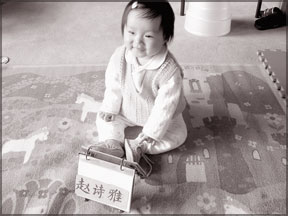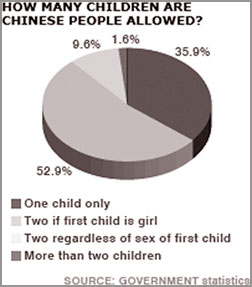Grey areas in China's one-child policy
In the third of a series of pieces on China's one-child policy, the
BBC's Michael Bristow looks at whether people are, in fact, only having
one child.
Wu Zhenfang, a 34-year-old mother, has done something that might
surprise a lot of Westerners - she has given birth twice.
Mrs Wu, from a village in Anhui province, has two healthy children,
an 11-year-old daughter and a seven-year-old son.

China's family planning rules are often referred to as the one-child
policy, but there are a significant number of people like Mrs Wu who are
allowed to have more.
There are also others who choose to ignore the rules and have extra
children regardless of the consequences.
Central government officials say it is not accurate to describe
China's efforts to control its population growth rate as a one-child
policy.
"China's family planning policy is absolutely not a one-foetus or
one-child policy," said Wang Guoqiang earlier this year when he was a
vice minister at the National Population and Family Planning Commission.
"There are different guidelines and different government policies,"
he added. Mr Wang explained that only 35.9% of the population is limited
to having just one child. These people live mainly in urban areas.
Many rural couples, accounting for 52.9% of the population, are able
to have two children if the first one is a girl, he said.
In other provinces, parents can have two children regardless of the
sex of the first child, and in a few areas the rules are even more
relaxed.
'Family name'
Mrs Wu was able to have two children because she comes from the
countryside and her first child was a girl.
"When I got married I only wanted one child. But because it was a
girl, my parents-in-law wanted me to try for a boy to carry on the
family name," she says.

Rural families also want boys so they can help with farm work, she
adds.
One downside of having two children is that Mrs Wu had to leave her
home village and travel to Beijing to find work to support her family.
She works as a nanny for a foreign couple.
Her daughter lives in Anhui province with her 80-year-old
mother-in-law. Her son lives with her and her husband in Beijing.
Apart from having a girl first, there are a number of other
categories of people that are allowed to have more than just one child.
Couples from certain ethnic minority groups can often have more than
one child, as can people who are the single children of "revolutionary
martyrs".
Overseas Chinese who settle in China are also exempt, and when both
parents have no siblings themselves they can have more than one child.
Penalty fines
There are also people who, even though they are legally entitled to
only one child, have two or more anyway.
In July, it was revealed that nearly 2,000 officials and celebrities
in Hunan Province breached the nation's family planning regulations
between 2000 and 2005.
Couples are usually fined if they contravene the rules.
The fine is based on how much the couple earns, and seems to vary
from region to region, but many families just pay up.
"The current penalties are too low for well-off people," a family
planning official from Hunan was reported as saying in the state media.
But despite the official - and unofficial - ways of having two or
more children, some experts say most families have to have just one
child, regardless of what the central government says.
A team of independent Chinese and foreign experts who recently
produced a report on the family planning rules say China has put a
positive spin on the figures.
For example, just over half the population might be able to have two
children if the first is a girl but, of course, couples are just as
likely to have a boy first. Taking that into consideration means the
majority of families are effectively limited to having just one child.
"We find that 63% of all couples in China could end up with only one
child, 36% with two children and only 1% with three or more," the
experts' report stated.
Family planning rules in China may be complex, and vary from region
to region, but one child is still the norm in most households.
BBC |
